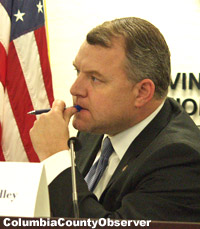Bradley's Bill Allowing Discretion in 'Low-Level' Drug Offender Sentences Heads to Senate Floor
Posted January 17, 2020 05:55 am

TALLAHASSEE, FL – The Senate Appropriations Committee Thursday unanimously approved a bill that would give judges discretion to vary from minimum-maximum sentences for non-violent, first-time drug offenders.
Senate Bill 346, filed by committee chair Sen. Rob Bradley, R-Fleming Island, already cleared by two Senate panels in pre-session hearings, now heads to the Senate floor.

Senator Rob Bradley
The measure “deals with people who are touched by addiction and gives judges discretion to craft sentences unique to the circumstances,” Bradley said. “Bring judges to the table. I think we are going to save lives, make our communities safer.”
Under the proposal, those convicted for the first time of buying or possessing less than 2 grams of any narcotic – with the exception of fentanyl – would not serve more than a year in jail.
The bill’s “clean hands provision” makes variances from minimum-maximum (min-max) sentences available only for defendants not previously convicted of a violent felony.
Bradley, a former prosecutor, said the bill would empty 1,500 “beds” a day in jails and prisons, remove 4,800 convicts from the prison system and save taxpayers $50 million a year.
The Florida Department of Corrections now houses of 96,000 inmates at an annual cost of $2.5 billion. About 166,000 offenders are on parole or probation.
The bill also requires interrogations to be recorded and includes a provision to compensate the wrongfully incarcerated since 2008.
“Videotaping confessions – can you imagine it is 2020 and we’re not doing this?” said Sen. Jeff Brandes, R- St. Petersburg, who has spearheaded the state’s criminal justice reform effort since 2016 and has filed numerous justice-related 2020 bills.
SB 346 is supported by a wide spectrum of groups, ranging from conservative organizations such as James Madison Institute, Americans for Prosperity (AFP) and Right on Crime, to liberal groups such as the League of Women Voters, Innocent Project Florida and the ACLU.
It is opposed by the Florida Sheriffs Association, Florida Police Chiefs Association and the Florida Prosecuting Attorneys Association, who say allowing judges discretion in cases that proscribe min-max sentences up to 25 years goes too far.
At that level, “that is a lot of drugs, a significant amount of drugs,” Florida Prosecuting Attorneys Association President Phil Archer said. “We’re not talking about addicts with a little drugs in their pockets.”
Archer said in 35 years as a prosecutor, he’s attended “100-plus” community meetings.
“Never once did someone raise their hand and say we were being too harsh on drug dealers. Just the opposite,” he said.
“Our prisons are not full of first-time, lower-level drug offenders,” said Manatee County Sheriff Charles Wells of the Florida Sheriffs Association, noting repeat offenders account for 95 percent of the prison population.
Eliminating min-max sentences would mean “you have people going to the courthouse and it depends on the luck of the draw which judge you get,” Archer said.
The comments drew rebukes from speakers and committee members, with Sen. Bobby Powell, D-West Palm Beach, stating, “Law enforcement, please come to the mic with some solutions to correct the problem.”
Prosecutors want to keep “the hammer of the trial penalty” to persuade defendants to take lesser sentences or informing on others, Brandes said.
James Madison Institute’s Sal Nuzzo said opponents want to sustain a “status quo that has trapped addicts in prison and affected families for generations.”
Right On Crime’s Chelsea Murphy said “big bad Texas” does not have min-max sentencing and “no one can say Texas is not tough on crime.”
“Prosecutors, legislators and judges are elected. You don’t like it? Vote them out,” she said.
-------------------------------
This piece appeared in the The Center Square and was reprinted by the Columbia County Observer with permission or license.
Layout and graphics added by the Observer

 By
John Haughey | The Center Square
By
John Haughey | The Center Square